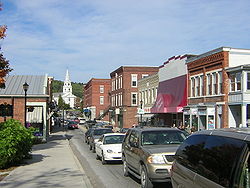Middlebury Union Middle School
| Middlebury, Vermont | ||
|---|---|---|
| Town | ||

Main Street
|
||
|
||
 Location in Addison County and the state of Vermont. |
||
| Coordinates: 44°0′7″N 73°8′44″W / 44.00194°N 73.14556°WCoordinates: 44°0′7″N 73°8′44″W / 44.00194°N 73.14556°W | ||
| Country | United States | |
| State | Vermont | |
| County | Addison | |
| Chartered | 1761 | |
| Area | ||
| • Total | 39.2 sq mi (101.6 km2) | |
| • Land | 38.8 sq mi (100.6 km2) | |
| • Water | 0.4 sq mi (1.0 km2) | |
| Elevation | 427 ft (130 m) | |
| Population (2010) | ||
| • Total | 8,496 | |
| • Density | 219/sq mi (84.5/km2) | |
| Time zone | Eastern (EST) (UTC-5) | |
| • Summer (DST) | EDT (UTC-4) | |
| ZIP code | 05753 | |
| Area code(s) | 802 | |
| FIPS code | 50-44350 | |
| GNIS feature ID | 1462146 | |
| Website | www |
|
Middlebury is the shire town (county seat) of Addison County, Vermont, United States. The population was 8,496 at the 2010 census. Middlebury is home to Middlebury College and the Henry Sheldon Museum of Vermont History.
One of the New Hampshire Grants, Middlebury was chartered by Colonial Governor Benning Wentworth on November 2, 1761. The name "Middlebury" came from its location between the towns of Salisbury and New Haven. It was awarded to John Evarts and 62 others. The French and Indian Wars ended in 1763, and the first settlers arrived in 1766. John Chipman was the first to clear his land, Lot Seven. During the Revolutionary War, much of the town was burned in Carleton's Raid on November 6, 1778. After the war concluded in 1783, settlers returned to rebuild homes, clear forests and establish farms. Principal crops were grains and hay.
Landowners vied for the lucrative honor of having the village center grow on their properties. A survey dispute with Salisbury led to the forfeiture of Gamaliel Painter's farm to that town, and his transition from farming to developing Middlebury Village near his and Abisha Washburn's mill, together with other mills that surrounded the Otter Creek falls. Industries would include a cotton factory, sawmill, gristmill, pail factory, paper mill, woolen factory, iron foundry, and marble quarry. The Rutland & Burlington Railroad first arrived on September 1, 1849. Around 1830, Middlebury was the second largest town in Vermont.
...
Wikipedia

